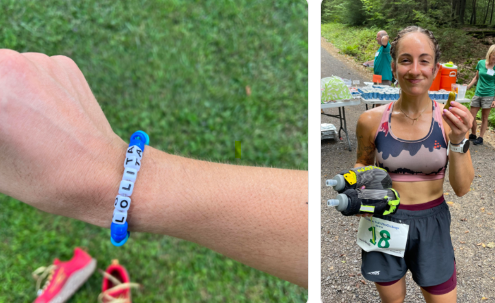Animals Abused for Entertainment
In Honor of Lolita
Special Thanks to
In Honor of Lolita
Update from 8/27: I finished the race in a little over 10 hours and 30 minutes, and came in 4th female. Thank you so much for the donations and support - now let's get Corky out of SeaWorld and to a seaside sanctuary!!

--
After spending more than 5 decades imprisoned by the Miami Seaquarium in the smallest, bleakest orca tank in the world, deprived of any semblance of a natural life, the long-suffering orca Lolita has passed away on August 18. She was so close to finally being moved to a seaside sanctuary, but never made it there. I'm participating in a 50 mile race this Saturday (8/26) in her honor and to raise awareness on what goes on behind the scenes at marine parks. I will be thinking about her and all other animals in captivity who don't have the chance to freely swim, run, climb, etc.
Lolita, who was captured from the wild in 1970 along with other orcas who were sent to SeaWorld parks, lived at the Miami Seaquarium without another orca from the time her companion, Hugo, died in 1980 after repeatedly ramming his head into the tank wall. The Seaquarium then held Lolita in a tank with incompatible dolphins who attacked her. She displayed repetitive and abnormal behavior, which, according to marine-mammal experts, indicated severe psychological trauma.
PETA urges everyone to honor her memory by never visiting marine parks and is calling on the Seaquarium to continue with plans to send the dolphin who was Lolita’s tankmate to a seaside sanctuary, along with all the other dolphins, before the death toll rises, and for SeaWorld to learn from this tragedy and relinquish the orca Corky, who has been imprisoned in tiny tanks for nearly 54 years, before she shares Lolita’s fate.
When this race gets tough, I'll remind myself that 50 miles is nothing compared to 50 years.
--
Click here to help: https://support.peta.org/page/1943/action/1?locale=en-US&en_txn7=blog::Lolita-obit
Info on the race: https://www.rachelcarsontrails.org/events/ultrachallenge
--
Other ways to help marine animals:
Every year, millions of tons of plastic enter our ocean and threaten the lives of marine animals. Birds, dolphins, whales, and turtles become entangled in plastic and die from suffocation, starvation, or drowning. If consumed, tiny particles of plastic can cause fatal health issues for marine animals. To help protect marine life from the dangers of plastic, you can…
- Don't eat fish - abandoned fishing gear is the most harmful form of marine debris for animals, and worldwide more than 650,000 marine mammals die as fishery “bycatch” annually
- Ask for no plastic silverware when ordering takeout (although this isn't the main source of plastic found in the ocean, see here: https://www.peta.org/blog/plastic-straws-ocean-animals/)
- Carry a reusable water bottle and reusable grocery bags (that you fill with vegan items!)
- Recycle at home and at the workplace
- Participate in neighborhood and beach clean-ups
All water eventually finds its way to the ocean. Unfortunately, contaminated water can carry harmful chemicals that kill marine life and produce dangerous algae blooms. To reduce runoff and conserve water, you can…
- Take shorter showers
- Use a rain barrel to collect water for your garden
- Turn off automatic watering systems in your yard when it rains
- Limit laundry days to when you have a full load and regularly wash small items by hand
- Turn the water off while brushing your teeth
Take further action: https://headlines.peta.org/ways-help-fish-take-action-now/
Create a Fundraiser
Create Your Own Fundraiser
Full marathons, half marathons, 10Ks, 5Ks, or maybe even just a walk with your dog around the neighborhood—your page is customizable and will be online right after you create it. You can then promote it through social media and e-mails to your friends and family.
Please wait ...




